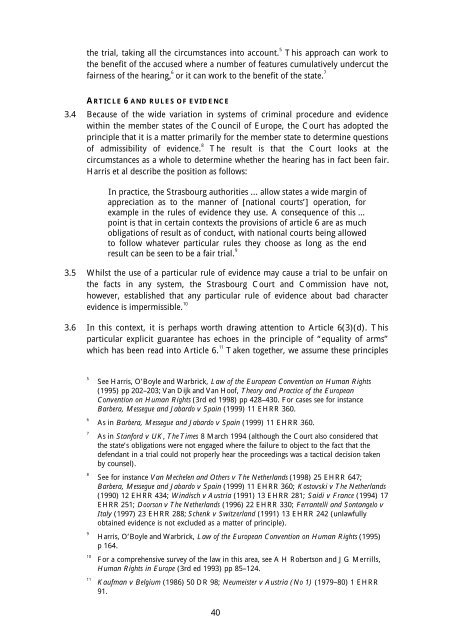Evidence of Bad Character in Criminal ... - Law Commission
Evidence of Bad Character in Criminal ... - Law Commission
Evidence of Bad Character in Criminal ... - Law Commission
Create successful ePaper yourself
Turn your PDF publications into a flip-book with our unique Google optimized e-Paper software.
the trial, tak<strong>in</strong>g all the circumstances <strong>in</strong>to account. 5 This approach can work to<br />
the benefit <strong>of</strong> the accused where a number <strong>of</strong> features cumulatively undercut the<br />
fairness <strong>of</strong> the hear<strong>in</strong>g, 6 or it can work to the benefit <strong>of</strong> the state. 7<br />
ARTICLE 6 AND RULES OF EVIDENCE<br />
3.4 Because <strong>of</strong> the wide variation <strong>in</strong> systems <strong>of</strong> crim<strong>in</strong>al procedure and evidence<br />
with<strong>in</strong> the member states <strong>of</strong> the Council <strong>of</strong> Europe, the Court has adopted the<br />
pr<strong>in</strong>ciple that it is a matter primarily for the member state to determ<strong>in</strong>e questions<br />
<strong>of</strong> admissibility <strong>of</strong> evidence. 8 The result is that the Court looks at the<br />
circumstances as a whole to determ<strong>in</strong>e whether the hear<strong>in</strong>g has <strong>in</strong> fact been fair.<br />
Harris et al describe the position as follows:<br />
In practice, the Strasbourg authorities ... allow states a wide marg<strong>in</strong> <strong>of</strong><br />
appreciation as to the manner <strong>of</strong> [national courts’] operation, for<br />
example <strong>in</strong> the rules <strong>of</strong> evidence they use. A consequence <strong>of</strong> this …<br />
po<strong>in</strong>t is that <strong>in</strong> certa<strong>in</strong> contexts the provisions <strong>of</strong> article 6 are as much<br />
obligations <strong>of</strong> result as <strong>of</strong> conduct, with national courts be<strong>in</strong>g allowed<br />
to follow whatever particular rules they choose as long as the end<br />
result can be seen to be a fair trial. 9<br />
3.5 Whilst the use <strong>of</strong> a particular rule <strong>of</strong> evidence may cause a trial to be unfair on<br />
the facts <strong>in</strong> any system, the Strasbourg Court and <strong>Commission</strong> have not,<br />
however, established that any particular rule <strong>of</strong> evidence about bad character<br />
evidence is impermissible. 10<br />
3.6 In this context, it is perhaps worth draw<strong>in</strong>g attention to Article 6(3)(d). This<br />
particular explicit guarantee has echoes <strong>in</strong> the pr<strong>in</strong>ciple <strong>of</strong> “equality <strong>of</strong> arms”<br />
which has been read <strong>in</strong>to Article 6. 11 Taken together, we assume these pr<strong>in</strong>ciples<br />
5 See Harris, O’Boyle and Warbrick, <strong>Law</strong> <strong>of</strong> the European Convention on Human Rights<br />
(1995) pp 202–203; Van Dijk and Van Ho<strong>of</strong>, Theory and Practice <strong>of</strong> the European<br />
Convention on Human Rights (3rd ed 1998) pp 428–430. For cases see for <strong>in</strong>stance<br />
Barbera, Messegue and Jabardo v Spa<strong>in</strong> (1999) 11 EHRR 360.<br />
6 As <strong>in</strong> Barbera, Messegue and Jabardo v Spa<strong>in</strong> (1999) 11 EHRR 360.<br />
7 As <strong>in</strong> Stanford v UK, The Times 8 March 1994 (although the Court also considered that<br />
the state’s obligations were not engaged where the failure to object to the fact that the<br />
defendant <strong>in</strong> a trial could not properly hear the proceed<strong>in</strong>gs was a tactical decision taken<br />
by counsel).<br />
8 See for <strong>in</strong>stance Van Mechelen and Others v The Netherlands (1998) 25 EHRR 647;<br />
Barbera, Messegue and Jabardo v Spa<strong>in</strong> (1999) 11 EHRR 360; Kostovski v The Netherlands<br />
(1990) 12 EHRR 434; W<strong>in</strong>disch v Austria (1991) 13 EHRR 281; Saidi v France (1994) 17<br />
EHRR 251; Doorson v The Netherlands (1996) 22 EHRR 330; Ferrantelli and Sontangelo v<br />
Italy (1997) 23 EHRR 288; Schenk v Switzerland (1991) 13 EHRR 242 (unlawfully<br />
obta<strong>in</strong>ed evidence is not excluded as a matter <strong>of</strong> pr<strong>in</strong>ciple).<br />
9 Harris, O’Boyle and Warbrick, <strong>Law</strong> <strong>of</strong> the European Convention on Human Rights (1995)<br />
p 164.<br />
10 For a comprehensive survey <strong>of</strong> the law <strong>in</strong> this area, see A H Robertson and J G Merrills,<br />
Human Rights <strong>in</strong> Europe (3rd ed 1993) pp 85–124.<br />
11 Kaufman v Belgium (1986) 50 DR 98; Neumeister v Austria (No 1) (1979–80) 1 EHRR<br />
91.<br />
40

















